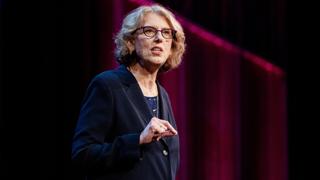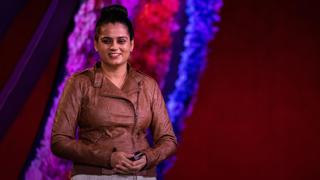
Why Africa needs community-led conservation | Resson Kantai Duff
Conservation efforts in Africa have typically been led by "parachute conservationists" -- outsiders who drop in thinking they have all the answers, hire locals to implement them and then disappear. But conservationist Resson Kantai Duff has a better way to save wildlife in Africa: let locals lead these efforts themselves. She calls for a major shift in how conservation in Africa works, showing why the people closest to the land are the ones best fit to care for it.
16 Maj 202213min

Listen now: Season 2 | Body Stuff with Dr. Jen Gunter
Can you really boost your metabolism? Is blue light actually ruining your sleep? How much vaginal yeast is healthy, and when is it ... too much? Body Stuff is back for a second season to bust the lies you're told -- and sold -- about your personal health. Join Dr. Jen Gunter as she addresses common myths, from the incredible ways your sense of taste and smell work to some harmful misconceptions about opioids and the biggest pain on our backs (literally). Whether you're curious to learn more about the world inside you or want to escape the online hot takes that promise to tell you how to optimize your health, this season dives even deeper into how your body really works. Produced in partnership with Transmitter Media. Listen to Season 1 and other podcasts from the TED Audio Collective now at youtube.com/tedaudiocollective.
15 Maj 20221min

The future of the food ecosystem -- and the power of your plate | Ndidi Okonkwo Nwuneli
Many people across the world don't have access to healthy food -- while in other places tons of food go to waste. Social entrepreneur Ndidi Okonkwo Nwuneli thinks we can take bold steps to fix this problem. She lays out what it would take to build a more equitable, sustainable food system that nourishes all people and asks us to widen our perspectives before eating our next meal.
14 Maj 202210min

The crime-fighting power of cross-border investigative journalism | Bektour Iskender
Organized crime operates across national borders -- to keep up, investigative journalists need to do the same. TED Fellow Bektour Iskender gives the inside scoop on his efforts to unveil secret, insidious operations in his home country of Kyrgyzstan, and how he worked with a team of journalists to uncover corruption and spark a national movement. He shares three key insights on how global networks of investigative journalists protect the world not just from smugglers and thieves but from dictators and warmongers.
13 Maj 20229min

How to stop banks from investing in fossil fuels | Lucie Pinson
Money is pollution's biggest driving force -- particularly, the cash invested in dirty energy projects, says financial responsibility campaigner Lucie Pinson. She shares a three-pronged approach to stop banks from funding fossil fuel companies, including what she calls "collaborative blackmailing" (it's more ethical than it sounds). By demanding more accountability from polluting companies and encouraging ethical banking, Pinson shows how to cut off the problem at its source.
12 Maj 202211min

The case for a 4-day work week | Juliet Schor
The traditional approach to work needs a redesign, says economist Juliet Schor. She's leading four-day work week trials in countries like the US and Ireland, and the results so far have been overwhelmingly positive: from increased employer and customer satisfaction to revenue growth and lower turnover. Making the case for a four-day, 32-hour work week (with five days of pay), Schor explains how this model for the future of work could address major challenges like burnout and the climate crisis -- and shares how companies and governments could work together to make it a reality.
11 Maj 202211min

My long walk across India for women's freedom | Srishti Bakshi
There are 600 million women in India -- yet they are rarely seen outdoors after sunset because of safety concerns like harassment and catcalls. On a mission to create safer public spaces, women's rights advocate Srishti Bakshi talks about how she embarked on a 2,300-mile walk across the length of India (a distance equivalent to traveling from New York City to Los Angeles), conducting driving workshops to empower women's mobility across the country. "The more women see other women in public spaces, the more safe, independent and empowered each of us will be," Bakshi says.
10 Maj 20229min

The most powerful untapped resource in health care | Edith Elliott and Shahed Alam
Whether we're rushing a child to the emergency room after a fall or making chicken soup for a feverish spouse, love inspires us to act when a family member gets sick. Global health activists Edith Elliott and Shahed Alam believe we can harness this power to create better health outcomes for everyone. Learn how their organization Noora Health works with doctors and nurses in India and Bangladesh to train the family members of hospital patients with essential skills to support their sick loved ones -- and how they plan to expand their reach to support 70 million caregivers who care for more than one billion people over the next six years. (This ambitious plan is a part of the Audacious Project, TED's initiative to inspire and fund global change.)
9 Maj 20229min


